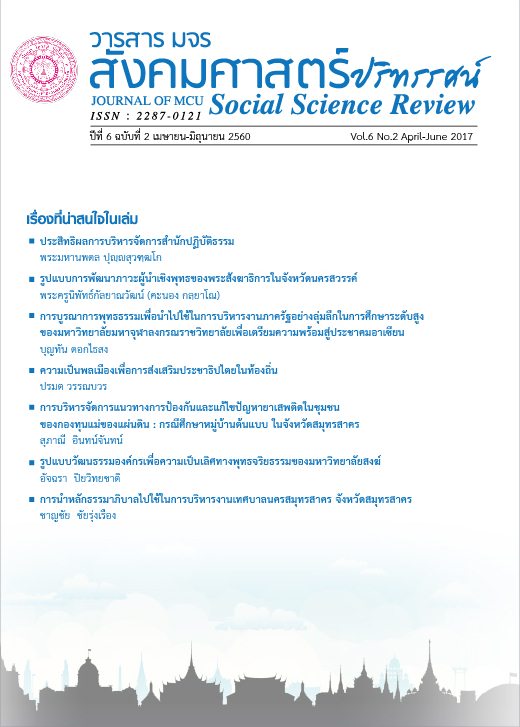สมรรถนะที่พึงประสงค์ของผู้อำนวยการเขต ในกรุงเทพมหานคร
คำสำคัญ:
สมรรถนะที่พึงประสงค์บทคัดย่อ
การวิจัยเรื่อง สมรรถนะที่พึงประสงค์ของผู้อานวยการเขต ในกรุงเทพมหานคร เป็นการ วิจัยเชิงปริมาณ กลุ่มตัวอย่างที่ใช้ในการศึกษาครั้งนี้ คือ ประชาชนที่มีอายุตั้งแต่ 18 – 60 ปี ที่มาติดต่อราชการ ณ สานักงานเขต ในกรุงเทพมหานคร โดยการกาหนดกลุ่มตัวอย่างโดยใช้สูตร Taro Yamane ซึ่งกลุ่มตัวอย่างที่เหมาะสมอยู่ที่ จานวน 400 คน โดยวิธีการจับฉลากรายชื่อเขต 4 แห่ง ได้ชื่อ เขตหนองจอก เขตบางแค เขตดอนเมือง และเขตพระนคร ใช้วิธีการสุ่มตัวอย่างแบบโควต้า คือ กาหนดให้แต่ละเขตมีกลุ่มตัวอย่าง จานวน 100 คนเท่ากัน จาก 4 เขต รวมกลุ่มตัวอย่างสิ้นจานวน 400 คน ใช้แบบสอบถามเป็นเครื่องมือในการเก็บข้อมูล สถิติที่ใช้ในการวิเคราะห์ข้อมูล ได้แก่ ร้อยละ ค่าเฉลี่ย และส่วนเบี่ยงเบนมาตรฐาน
ศึกษาสมรรถนะใน 3 ด้าน ได้แก่ ด้านความรู้ ด้านทักษะ และด้านคุณลักษณะอื่นๆ ซึ่งแบ่งออกเป็น สมรรถนะแต่ละด้านในภาพรวม สมรรถนะหลัก (Core Competency) ในแต่ละด้านและสมรรถนะตามสายวิชาชีพ (Function Competency) ในแต่ละด้าน ผลการวิจัยสรุปได้ว่าสมรรถนะหลัก (Core Competency) ด้านความรู้ : ผู้อานวยการเขตกรุงเทพมหานครมีสมรรถนะหลัก (Core Competency) ด้านความรู้ในภาพรวมอยู่ในระดับมาก ที่มีมากอันดับแรกได้แก่ ความรู้เกี่ยวกับการบริหารงาน
สมรรถนะตามสายวิชาชีพ (Function Competency) ด้านความรู้ ; ในภาพรวมทั้งหมดอยู่ในระดับมาก ที่มีมากอันดับแรก ได้แก่ ความรู้เกี่ยวกับการวางแผนสมรรถนะหลัก (Core Competency) ด้านทักษะ : ในภาพรวม อยู่ในระดับมาก ที่เห็นว่า มีใน อันดับแรก ได้แก่ ทักษะในการแก้ไขปัญหาเฉพาะหน้า และทักษะในการบริหารเวลา(ค่าเฉลี่ยเท่ากัน)สมรรถนะตามสายวิชาชีพ (Function Competency) ด้านทักษะ : ในภาพรวมอยู่ในระดับมาก ที่มีมากอันดับแรก ได้แก่ ทักษะด้านความคิดเชิงวิเคราะห์ และการบริหารเวลาสมรรถนะหลัก (Core Competency) ด้านคุณลักษณะอื่น ๆ : ในภาพรวมอยู่ในระดับมาก ที่มีมากอันดับแรก คือ มีคุณธรรม จริยธรรมสมรรถนะตามสายวิชาชีพ (Function Competency) ด้านคุณลักษณะอื่น ๆ ; ในภาพรวม อยู่ในระดับมาก ที่มีมากอันดับแรก ได้แก่ ความซื่อสัตย์
แนวทำงกำรพัฒนำสมรรถนะที่พึงประสงค์ของผู้อำนวยกำรเขต ในกรุงเทพมหานคร
1) ควรมีการฝึกอบรมให้บุคลากรใหม่ทุกคนมีความรู้เฉพาะตาแหน่ง ก่อนที่จะเข้าปฏิบัติหน้าที่หรือบรรจุแต่งตั้งเพื่อเตรียมความพร้อมในการปฏิบัติงาน
2) ควรมีการจัดฝึกอบรมในหลักสูตรต่าง ๆ เพื่อเพิ่มประสิทธิภาพการปฏิบัติงานให้บุคลากรทุกฝ่าย โดยจัดการอบรมอย่างสม่าเสมอ อย่างน้อยปีละ 2 ครั้ง เพื่อปรับปรุงการทางานให้เข้ากับสภาวการณ์ที่เปลี่ยนแปลงอยู่ตลอดเวลา
3) ควรมีการอบรมเพิ่มทักษะทั้งทางด้านการงานและจิตใจควบคู่กันไป เพื่อสร้างขวัญและกาลังใจให้แก่ผู้ใต้บังคับบัญชาในการปฏิบัติงาน
4) ควรสนับสนุนให้บุคลาการทุกฝ่ายเข้ารับการฝึกอบรมให้มากขึ้น และให้ตรงกับหลักสูตรและตาแหน่ง เพื่อนามาใช้ในการปฏิบัติงานและพัฒนาองค์กร
5) ควรกาหนดให้บุคลากรต้องหมั่นพัฒนา เพิ่มศักยภาพของตนเอง โดยการเข้ารับการฝึกอบรม ตลอดจนหาความรู้ด้านต่างๆที่เกี่ยวข้องตามแหล่งข้อมูลต่าง ๆ อยู่เสมอ
6) ควรจัดทาคู่มือเเอกสารการปฏิบัติงานบุคลากรทุกฝ่าย ให้เป็นมาตรฐานเดียวกัน
7) ควรใช้เทคโนโลยีสารสนเทศเข้ามาช่วยในการปฏิบัติหน้าที่ เพื่อให้สามารถทางานได้รวดเร็วยิ่งขึ้น
8) ควรมีการจัดตั้งกลุ่มหรือรวมกลุ่มในสายงานเพื่อช่วยเหลือแก้ไข และพัฒนาศักยภาพในการทางานของบุคลากร
เอกสารอ้างอิง
Boyatzis, R.E. (1999) . Clustering Competence in Emotional Intelligence : Insights from the Emotional Competence inventory (ECI). Retrieved December 10, 2005, From www.ei.haygroup.comเresourcesเLibrary_articles
Narongvit Santong. (2547). Getting to know COMPETENCY. Bangkok: H.R. Center.
Panid Insuwan. (2557). Competency of Chief Executive of Klongkarm Sub-District Administrative Organization, Yangtalad District, Kalasin Province (Master of Public Administration Independence Study) Graduate School: Rajabhat Mahasarakam University.
Pantipa Nakornchan. (2557). Administrative Competency of Administrators of Basic Education Schools in Angtong Province (Master of Education Independence Study) Patoomtani University.
Parat Chainurak. (2555). Administrative Competency of Administrators of Office of Bangkok Environment (Master of Arts Thesis). Faculty of Political Science: Ramkamhaeng University
Ratree Nantanakarn. (2557). The Principal Competency of Permanent Secretary of Sub-District Administrative Organizations in Lampang Province (Master of Poltical Science Independent Study). Graduate School: Chiangmai University
Spencer, LM. and Spencer, SM. (1993) . Competence at Work : Models for Superior Performance. Wiley,New York.
Sukanya Rasmeechote. (2548). Guideline for Human Competency Development by Competency-Based Learning Research and Information Section. National Productivity Institute.
Zwell, M. (2000). Creating a Culture of Competence. NewYork : John Wiley and Sons, Inc.
ดาวน์โหลด
เผยแพร่แล้ว
รูปแบบการอ้างอิง
ฉบับ
ประเภทบทความ
สัญญาอนุญาต
ลิขสิทธิ์ (c) 2018 วารสาร มจร สังคมศาสตร์ปริทรรศน์

อนุญาตภายใต้เงื่อนไข Creative Commons Attribution-NonCommercial-NoDerivatives 4.0 International License.
เพื่อให้เป็นไปตามกฎหมายลิขสิทธิ์ ผู้นิพนธ์ทุกท่านต้องลงลายมือชื่อในแบบฟอร์มใบมอบลิขสิทธิ์บทความให้แก่วารสารฯ พร้อมกับบทความต้นฉบับที่ได้แก้ไขครั้งสุดท้าย นอกจากนี้ ผู้นิพนธ์ทุกท่านต้องยืนยันว่าบทความต้นฉบับที่ส่งมาตีพิมพ์นั้น ได้ส่งมาตีพิมพ์เฉพาะในวารสาร มจร สังคมศาสตร์ปริทรรศน์ เพียงแห่งเดียวเท่านั้น หากมีการใช้ภาพหรือตารางหรือเนื้อหาอื่นๆ ของผู้นิพนธ์อื่นที่ปรากฏในสิ่งตีพิมพ์อื่นมาแล้ว ผู้นิพนธ์ต้องขออนุญาตเจ้าของลิขสิทธิ์ก่อน พร้อมทั้งแสดงหนังสือที่ได้รับการยินยอมต่อบรรณาธิการ ก่อนที่บทความจะได้รับการตีพิมพ์ หากไม่เป็นไปตามข้อกำหนดเบื้องต้น ทางวารสารจะถอดบทความของท่านออกโดยไม่มีข้อยกเว้นใดๆ ทั้งสิ้น





